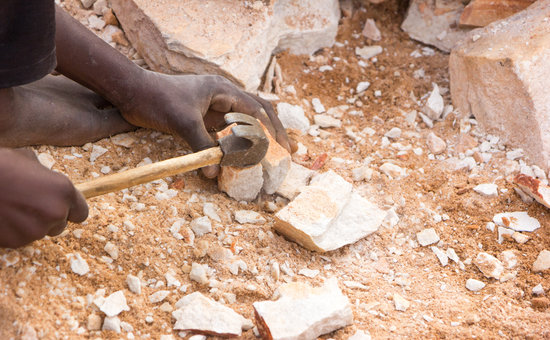Joseph Maggs, former Policy and Campaigns Intern at Liberty.

In this blog, Joseph Maggs explores the landmark case filed against five tech giants in December 2019 – and the “accountability gap” that leads to companies getting away with child labour in their supply chains.
In December, fourteen families from the Democratic Republic of Congo (DRC) filed a landmark legal case in Washington DC against five US tech giants Apple, Alphabet (Google’s parent company), Dell, Microsoft and Tesla.
They charge these multinationals with “knowingly benefiting from and aiding and abetting the cruel and brutal use of young children” in their supply chains. Driven by systemic poverty and often direct coercion, these children work for a pittance in dangerous conditions mining the cobalt that powers lucrative global commodities such as mobile phones, laptops and, increasingly, electric cars.
The families are taking these companies to court in the U.S., since there is no legal route in the DRC to hold them to account for the harm that was caused.
The case against the companies
A subsidiary of the mining giant Glencore owns many of the mines where these children work. Glencore supplies the cobalt ore to Umicore N.V., a Belgian company which traces its lineage back to the time of the brutal colonial Congo Free State. Umicore refines it and then sells the product on to the five companies in this case. The other key supplier in the region is a subsidiary of Zhejiang Huayou Cobalt, a Chinese company that was the focus of a damning report by Amnesty International and Afrewatch in 2016.
The formal legal complaint, submitted on behalf of the families by the human rights NGO International Rights Advocates (IRA), contains harrowing stories of life-altering injuries, tragic deaths, and parental grief, compounded by the complete lack of access to justice in domestic courts. The families are demanding substantial damages for their ordeals.
That much of their wealth is based on super-exploitation is far from news to these companies. An investigation published by the Washington Post in 2016 prompted Apple to temporarily suspend purchases of DRC cobalt from Huayao. But as soon as the dust settled, it was back to business as usual. What is new is that these companies are finally being challenged by their victims.
Glencore under investigation
Another first, also announced in December, was the launch of an investigation by the UK Serious Fraud Office (SFO) into suspected bribery at Glencore. Although Glencore is registered outside the UK, it is listed on the London Stock Exchange. This is enough, as Rights and Accountability in Development (RAID) noted: “The UK Bribery Act of 2010 extends jurisdiction to companies with a business nexus in the UK. The Glencore investigation will be the first time the SFO is applying the business nexus”.
No details of the investigation have been made public. However, there is plenty of evidence that corruption is rife in the global cobalt supply chain. For example, Dan Gertler, a key business partner of both Glencore and the Congolese ruling class, has previously been subject to sanctions in the US for corruption and human rights abuses.
Glencore may in future be prosecuted for “failure to prevent” bribery. But under the UK’s current legal framework for corporate accountability it could not be held to account for its failure to prevent human rights abuses and environmental degradation. Overall, the “accountability gap” remains stark.
The struggle ahead
There are, however, signs that the gap is narrowing. The cobalt case discussed above is one. In France, Total has been taken to court for failing to fulfil its obligations under the 2017 Duty of Vigilance Law. Last year in the UK, a landmark Supreme Court ruling gave over 1,800 Zambian villagers permission to proceed in its case against mining giant Vedanta.
But there is still a lack of clarity as to the legal responsibilities of UK companies. That’s why CORE and over twenty other organisations are calling for a new law that would require multinationals to address and prevent human rights abuses and environmental degradation by their subsidiaries and across their supply chains.
Campaigning for this new legal framework and, crucially, supporting the activities of communities and grassroots activists at the coalface of corporate abuses, is an urgent task for this new decade.

